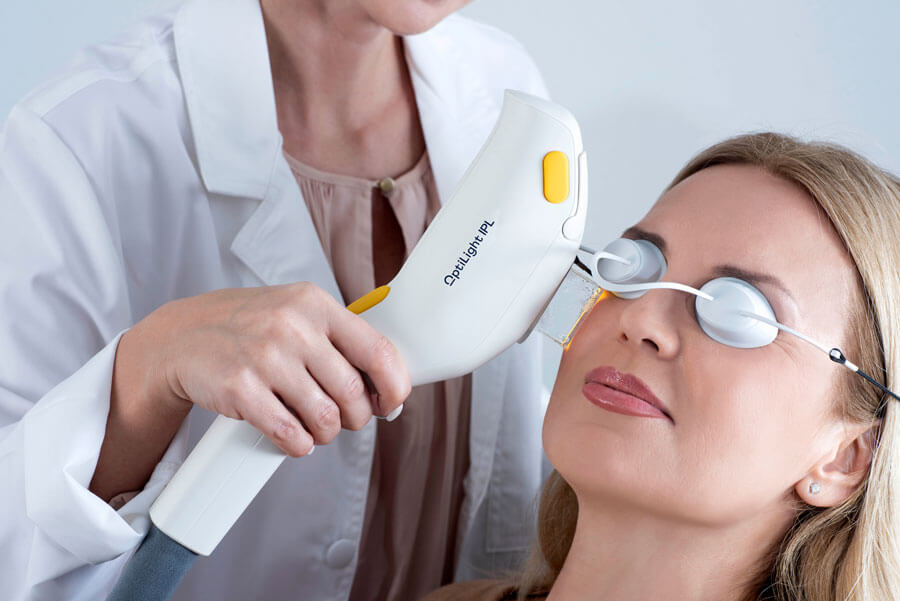
Intense Pulsed Light (IPL) for Dry Eye Disease
Dry eye disease (DED) is a common condition that affects millions of people worldwide, causing symptoms such as irritation, redness, burning, and a gritty sensation in the eyes. Traditional treatments like artificial tears, warm compresses, and prescription medications may not always provide long-term relief. In recent years, Intense Pulsed Light (IPL) therapy has emerged as an innovative and effective treatment for managing dry eye disease, particularly for patients with meibomian gland dysfunction (MGD)—a leading cause of DED.
What is IPL Therapy?
Intense Pulsed Light (IPL) is a technology originally used in dermatology for treating conditions such as rosacea, acne, and sun damage. However, researchers discovered that IPL can also help improve the function of the meibomian glands, which are responsible for producing the oily layer of the tear film. By reducing inflammation and unblocking these glands, IPL helps restore a healthier tear film and alleviate dry eye symptoms.
How IPL Works for Dry Eye Disease
IPL therapy uses pulses of broad-spectrum light applied to the skin around the eyes, specifically targeting inflammation, abnormal blood vessels, and clogged meibomian glands. The process works in several ways:
1. Reduces Inflammation – IPL decreases the number of inflammatory mediators that contribute to dry eye disease.
2. Eliminates Abnormal Blood Vessels – It helps close off small, leaky blood vessels that release inflammatory substances in the eyelid area.
3. Stimulates Meibomian Gland Function – The heat generated by IPL softens hardened oil in the glands, allowing them to secrete properly and improve tear stability.
4. Kills Bacteria and Demodex Mites – IPL has antimicrobial properties that help reduce bacteria and Demodex mites, which can contribute to eyelid inflammation and dry eye symptoms.
The IPL Treatment Process
IPL therapy for dry eye disease is performed in a clinic by an eye care professional. Here’s what you can expect:
1. Pre-Treatment Preparation
• The patient will wear protective goggles to shield their eyes from the light pulses.
• A cooling gel is applied to the treatment area (cheeks and eyelids) to help conduct the light energy and protect the skin.
2. Light Application
• The clinician uses a handheld IPL device to deliver a series of light pulses to the skin below the eyes. The pulses feel like a mild snapping or warming sensation.
• The session typically lasts 10–15 minutes.
3. Meibomian Gland Expression
• After IPL treatment, many providers manually express the meibomian glands to remove any thickened oil and further improve gland function.
4. Post-Treatment Care
• Patients may experience mild redness or warmth in the treated area, which subsides within a few hours.
• Sun protection is recommended, as the skin may be more sensitive following the procedure.
5. Treatment Schedule
• Most patients require 3–4 IPL sessions spaced 2–4 weeks apart, followed by occasional maintenance treatments depending on symptom severity.
Benefits of IPL for Dry Eye Disease
• Long-Lasting Symptom Relief – Many patients experience significant and sustained improvements in tear quality and eye comfort.
• Non-Invasive and Quick – IPL is a painless, outpatient procedure with no downtime.
• Reduces Dependence on Eye Drops – Many patients find they need artificial tears less frequently after IPL treatment.
• Improves Overall Eyelid Health – By reducing inflammation and bacterial overgrowth, IPL contributes to healthier eyelids and meibomian gland function.
Who is a Good Candidate for IPL?
IPL therapy is particularly effective for patients with meibomian gland dysfunction (MGD) and ocular rosacea. However, it may not be suitable for individuals with:
• Darker skin tones (as IPL can affect pigmentation)
• Certain skin conditions or sensitivities
• A history of light-induced seizures or photosensitivity disorders
A thorough evaluation by an eye care specialist is necessary to determine whether IPL is the right treatment option.
Conclusion
IPL therapy is a breakthrough treatment for dry eye disease, offering long-term relief by targeting the root causes of meibomian gland dysfunction and eyelid inflammation.
At Natural State Eyecare, we offer the only FDA-approved IPL treatment for dry eye called the Lumenis M22 OptiLight. For evaluation and/or pricing information, call or text 501-295-4011.








